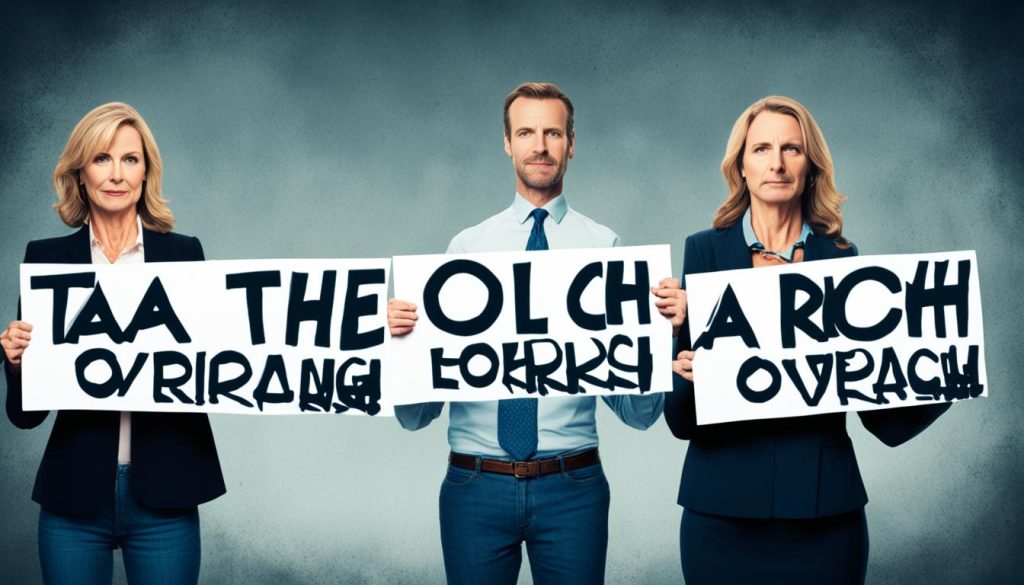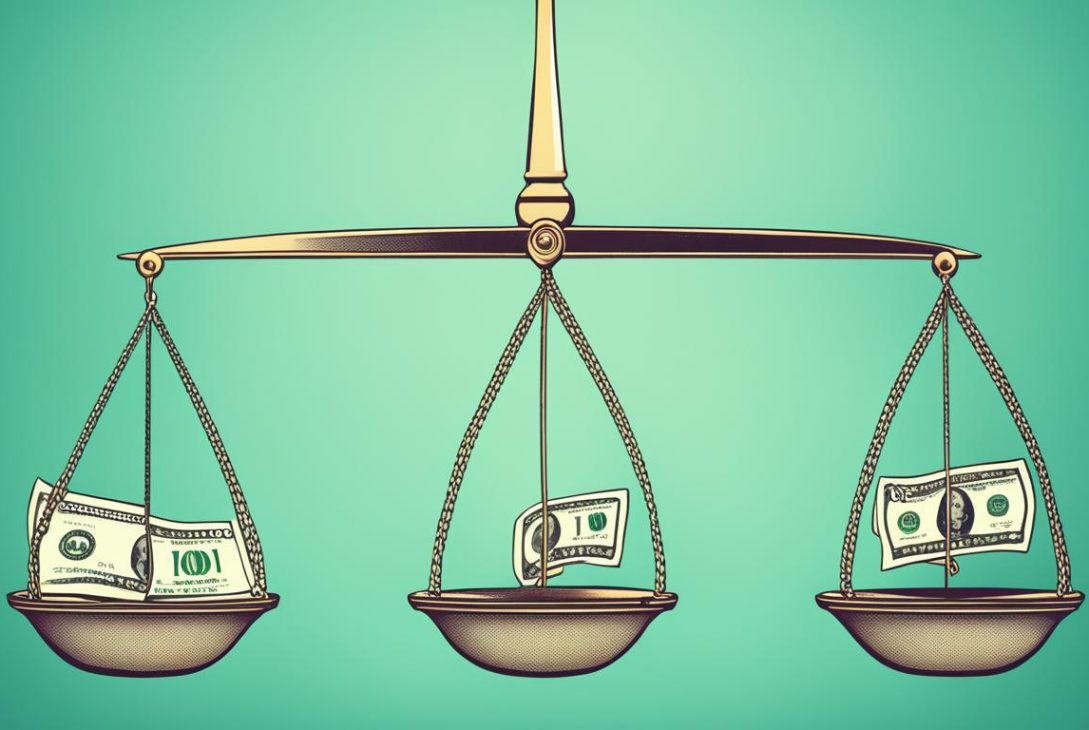President Biden’s budget proposal for the coming fiscal year includes tax increases for large corporations and a minimum 25 percent tax rate for billionaires. The proposal aims to reduce the federal deficit by about $3 trillion over a 10-year period by raising taxes on the wealthiest Americans and businesses. It also includes measures to support low- and middle-income families and address issues such as child care, prescription drugs, and housing.
Key Takeaways:
- Tax increases for large corporations and a minimum 25 percent tax rate for billionaires are part of President Biden’s budget proposal.
- The proposal aims to reduce the federal deficit and support low- and middle-income families.
- Income inequality, wealth distribution, and equitable taxation are key considerations in the debate on taxing the rich.
- Opponents argue that excessive taxation on the rich may discourage investment and entrepreneurship.
- Balancing the need for equitable taxation with encouraging economic growth is a complex task.
The Impact of Taxing the Rich
Implementing a progressive tax system with higher tax rates for top earners, such as billionaires, is a strategy that aims to address income inequality and reduce the wealth gap. By requiring the rich to contribute a larger share of their income through taxes, it can lead to a more equitable distribution of wealth.
A progressive tax system is based on the principle that those who earn more should pay a higher percentage of their income in taxes compared to those with lower incomes. This approach aims to ensure that the burden of taxation is proportionate and falls more heavily on individuals who can afford to contribute more without compromising their standard of living.
Proponents of a progressive tax system argue that it can help to narrow the wealth gap by redistributing wealth from the top earners to support social programs and initiatives that benefit the wider society. They believe that it is a fair and just approach to ensure that everyone pays their fair share in proportion to their income.
However, critics of taxing the rich raise concerns about the potential negative impact on investment and entrepreneurship. They argue that excessive taxation on the wealthy may discourage them from investing or taking risks, which could potentially slow down economic growth. They believe that a favorable environment for business and investment is crucial for economic prosperity and job creation.
Critics argue that excessive taxation on the rich may discourage investment and entrepreneurship, potentially slowing down economic growth.
It is essential to strike a balance between taxation and economic growth. While implementing a progressive tax system can contribute to reducing income inequality, policymakers must consider the potential consequences and ensure that the tax structure supports overall economic prosperity.
In summary, the impact of taxing the rich through a progressive tax system is a topic of ongoing debate. Supporters believe that it is an effective measure to address income inequality and promote wealth redistribution. However, critics express concerns about the potential impact on investment and economic growth. Striking the right balance between an equitable tax system and fostering a favorable economic environment remains a challenge.
Arguments For Taxing the Rich
Proponents of taxing the rich argue that it is a necessary step towards achieving equitable taxation. They believe that high-income individuals should pay a larger share of their income in taxes, as they have benefited the most from society’s resources and infrastructure. By redistributing wealth, it is believed that it can help address income inequality and create a fairer society.
“Taxing the rich allows us to create a more level playing field and reduce the gap between the haves and the have-nots. It ensures that those who have benefitted the most from our society contribute their fair share to help uplift those who are less fortunate.”
Implementing a progressive tax system that places a heavier burden on the wealthy can be seen as a way to promote wealth distribution and bridge the divide between socioeconomic classes. By asking high-income individuals to pay their fair share of taxes, it can provide much-needed funding for essential services, social programs, and infrastructure development.
Furthermore, proponents argue that taxing the rich is not just about generating revenue, but also about promoting income equality and social justice. The concentration of wealth among a small percentage of the population can have negative consequences for society as a whole. By implementing fair and equitable tax policies, it can help create a more inclusive and just society.
Proponents also argue that taxing the rich can have positive economic effects. When wealth is concentrated in the hands of a few, it can lead to hoarding rather than investment. By taxing the rich and redistributing the wealth, it can stimulate economic growth by providing resources for public investments, job creation, and access to essential services.
Wealth Distribution Impact
The impact of taxing the rich on wealth distribution can be seen in the following example:
| Wealth Distribution Before Tax | Wealth Distribution After Tax |
|---|---|
| Top 1% – 40% | Top 1% – 35% |
| Bottom 90% – 25% | Bottom 90% – 30% |
Arguments Against Taxing the Rich
While there are proponents of taxing the rich, there are also valid arguments against implementing such measures. Critics of taxing high net worth individuals believe that it unfairly targets this specific group and can discourage wealth creation. They argue that the rich already contribute a substantial amount in taxes and imposing additional taxes solely on them may be seen as punitive.
One of the main concerns raised by opponents is the potential for capital flight. They argue that if taxes on the rich become too burdensome, individuals may choose to move their wealth to other countries with more favorable tax regimes. This capital flight could lead to a loss of investment and economic opportunities within the country, ultimately hindering economic growth.
“Taxing the wealthy to such an extent may not only discourage investment but also undermine entrepreneurship and innovation, which are critical drivers of economic growth.”
Detractors of implementing a billionaire tax also highlight the risk of overreach by the government. They contend that such measures may infringe upon personal property rights and hinder individual economic freedom. Furthermore, opponents argue that it is not solely the responsibility of the wealthy to address income inequality and provide for societal needs, as these issues require a collective effort.
Impact on Economic Growth
Opponents of taxing the rich emphasize that discouraging wealth creation can have negative consequences for overall economic growth. They argue that high net worth individuals play a vital role in driving investment, entrepreneurship, and job creation. By imposing additional taxes and regulations, there is a concern that these individuals may be less inclined to take risks and invest in new ventures, which could impede innovation and economic development.
It is important to consider the potential repercussions of taxing the rich and address the concerns raised by critics. While the goal of reducing wealth inequality and ensuring a fair taxation system is commendable, it is crucial to strike a balance that promotes economic growth while addressing societal needs.
Historical Perspective on Taxing the Rich
Taxing the rich has long been a subject of debate and has played a crucial role in shaping our society’s economic policies. Throughout history, different tax policies have been implemented to address income distribution and consider the contribution of the wealthy to societal needs. By examining the historical context of taxing the rich, we can gain valuable insights into the current debate and potential implications.
One approach countries have taken is to implement higher taxes on the rich. This strategy aims to create a more equal distribution of wealth and reduce the income gap between the rich and the rest of society. By requiring the wealthy to contribute a larger share of their income, these policies attempt to promote fairness and social justice.
However, not all countries have followed this path. Some nations have focused on creating incentives for wealth creation rather than imposing higher taxes on the rich. These policies aim to encourage entrepreneurship and economic growth, believing that a thriving economy benefits society as a whole. By offering tax breaks and other incentives to the wealthy, these countries hope to stimulate investment and innovation.
Examining the historical context of tax policies provides us with a broader understanding of the approaches taken and their impact on income distribution. It showcases the range of perspectives and strategies employed in different societies and serves as a valuable resource for evaluating the effectiveness of various tax policies. By analyzing the successes and failures of past initiatives, we can inform the ongoing debate on taxing the rich and make informed decisions about the best course of action.
In summary, understanding the historical context of taxing the rich is key to comprehending the complexities surrounding income distribution and the role of the wealthy in society. By considering the various tax policies implemented throughout history, we can gain insights that inform the contemporary debate on taxing the rich and enable us to shape effective and equitable tax policies for the future.
Global Examples of Taxing the Rich
Several countries have adopted different measures to address international taxation and wealth redistribution. By implementing various forms of wealth tax and high income tax rates for the wealthy, these countries aim to tackle income inequality and promote a fairer society.
“France has taken a bold approach by implementing a wealth tax specifically targeting high net worth individuals,”
The French wealth tax, known as Impôt de Solidarité sur la Fortune (ISF), requires individuals with a net worth above a certain threshold to pay an annual tax. This targeted approach aims to redistribute wealth and reduce the concentration of financial resources in the hands of a few.
Furthermore, Nordic countries like Denmark and Sweden have taken steps to tax the rich through their progressive income tax systems. These countries have higher tax rates for the wealthy, ensuring a greater contribution from those who can afford it.
Case Study: Denmark’s High Tax Rates for the Wealthy
In Denmark, individuals with higher incomes face progressively higher tax rates. The country follows a progressive tax system where tax rates increase as income levels rise. This approach helps fund public services, social welfare programs, and investments in infrastructure and education.
Case Study: Sweden’s Wealth Tax
Sweden has historically implemented a wealth tax, targeting individuals with substantial net assets. The tax is calculated based on an individual’s total wealth, including real estate, financial assets, and valuable possessions. This wealth tax is seen as a way to redistribute resources and promote more equitable wealth distribution.
Exploring global examples of taxing the rich provides valuable insights into different approaches and their potential impact on wealth redistribution and income inequality. While these examples may not directly apply to every country, they offer perspectives and ideas for policymakers around the world seeking to address these crucial issues.
Economic Implications of Taxing the Rich
The economic implications of taxing the rich are a subject of extensive debate among economists. Supporters argue that implementing higher taxes on the wealthy can provide substantial funding for social programs, infrastructure development, and education. They contend that this increased investment in public services can contribute to long-term economic growth by creating a more equitable society with improved opportunities for all.
On the other hand, opponents raise concerns that taxing the rich excessively may have negative effects on investment and entrepreneurship. They argue that high tax rates can disincentivize wealthy individuals from investing in new ventures and starting businesses, potentially slowing down overall economic growth.
To strike a balance between generating revenue and fostering economic growth, policymakers must carefully consider the potential consequences of taxing the rich. It is crucial to analyze the impact of these tax measures on investment, entrepreneurial activity, and overall economic productivity.
A comprehensive evaluation of the economic implications of taxing the rich should include a thorough assessment of the potential effects on businesses, investment patterns, and job creation. By examining both the positive and negative aspects, policymakers can make informed decisions that lead to a fair and sustainable tax system, promoting economic prosperity for all segments of society.
Table: Economic Implications of Taxing the Rich
| Arguments in Favor of Taxing the Rich | Arguments Against Taxing the Rich |
|---|---|
|
|
Alternatives to Taxing the Rich
While taxing the rich is one approach to address income inequality, there are alternative measures that can be considered. Progressive policies that focus on wealth redistribution, such as expanding access to education and healthcare, can also help reduce the wealth gap. Additionally, increased public spending in areas like infrastructure and job creation can stimulate economic growth and provide opportunities for all individuals to thrive.
Progressive Policies for Wealth Redistribution
Implementing progressive policies that prioritize wealth redistribution can be an effective alternative to solely relying on taxing the rich. By creating a more equitable system, society can ensure that resources and opportunities are fairly distributed among all individuals. Expanding access to quality education and healthcare, for example, can help level the playing field and provide a pathway to success for those from disadvantaged backgrounds.
Investing in Public Spending
Another alternative to taxing the rich is to increase public spending in key areas such as infrastructure and job creation. By investing in public projects, governments can stimulate economic growth and create opportunities for everyone, including those who may be marginalized or struggling financially. This approach not only helps address income inequality but also contributes to the overall well-being of society.
“Investing in public spending is essential for fostering inclusive economic growth and reducing wealth disparities. By strategically allocating resources to areas like infrastructure and job creation, governments can create a more sustainable and equitable future for all.”
The Power of Progressive Taxation and Public Investment
By combining progressive tax policies with increased public spending, societies can effectively address issues related to wealth redistribution, income inequality, and economic growth. Progressive taxation ensures that the burden of contributing to society falls on those who can afford it the most, while public investment provides resources and opportunities for all individuals to thrive.
| Alternative Measures | Benefits |
|---|---|
| Progressive policies |
|
| Increased public spending |
|
While taxing the rich is one way to address income inequality, exploring alternative measures can provide comprehensive solutions. By implementing progressive policies and increasing public spending, societies can strive towards a more equitable future, where wealth and opportunities are accessible to all individuals.
Public Opinion on Taxing the Rich
The public’s perception of taxing the rich is divided, with varying views on its impact and effectiveness. Advocates argue that it is a necessary step towards achieving social justice and reducing wealth inequality. They believe that by redistributing wealth and ensuring that the rich pay their fair share of taxes, society can become more equitable. It is seen as a means of addressing the growing wealth gap and providing resources for programs that benefit low- and middle-income individuals.
On the other hand, opponents of taxing the rich view it as government overreach and potentially discouraging economic growth. They argue that excessive taxation on high-income individuals may deter investment and entrepreneurship, which could negatively impact the overall economy. They highlight the role of the wealthy in driving innovation, job creation, and economic development.
Surveys and polls reflect this divide. They show varying levels of support for taxing the rich, often influenced by factors such as political affiliation and personal financial circumstances. Additionally, attitudes towards taxation may differ based on region and cultural perspectives.
“Taxing the rich is a necessary step towards a more just society, where wealth is distributed more equitably. It can help tackle wealth inequality and provide funding for essential services.” – Public opinion poll respondent
“Excessive taxation on the wealthy hampers economic growth and innovation. It disincentivizes entrepreneurship and job creation.” – Public opinion poll respondent
The Link Between Taxing the Rich and Social Justice
Taxing the rich is often seen as a way to address social justice concerns. Advocates argue that it can help level the playing field, reduce disparities in wealth and income, and create a more just society. By implementing progressive tax measures that require the rich to contribute more proportionally to society, it is believed that wealth inequality can be mitigated. This approach aligns with the concept of social justice, where fairness and equitable distribution of resources are prioritized.
Taxing the Rich and Wealth Inequality
Wealth inequality is a growing concern in many societies, with the gap between the rich and the poor widening. Taxing the rich is viewed as a potential solution to help address this issue. Proponents argue that by implementing higher tax rates on the wealthy, it will contribute to a more balanced distribution of wealth, ensuring that those who have accumulated significant wealth contribute their fair share. By reducing wealth inequality, it is believed that more individuals will have access to resources and opportunities for upward mobility.
The Role of Taxing the Rich in Achieving Social Justice
Social justice aims to create a society where fairness, equality, and justice prevail. Taxing the rich is seen as a critical component of achieving these goals. By implementing policies that ensure the wealthy contribute more to society through taxation, a more equitable distribution of resources can be achieved. It is viewed as a means of addressing systemic inequalities and creating a society where everyone has equal opportunities for success.
Public Perception and the Future of Taxing the Rich
The public’s perception of taxing the rich will continue to shape the discourse around wealth distribution and social justice. As wealth inequality remains a pressing issue, it is likely that discussions on taxing the rich will persist in the public sphere. The outcome of these debates will depend on a nuanced understanding of the economic implications, the effectiveness of alternative approaches, and the extent to which society is willing to prioritize social justice in its tax policies.
| Pros of Taxing the Rich | Cons of Taxing the Rich |
|---|---|
| Reduces wealth inequality | Potential negative impact on economic growth |
| Funds social programs and initiatives | Perceived government overreach |
| Contributes to social justice | Potential deterrent to investment and entrepreneurship |

Conclusion
The debate surrounding taxing the rich revolves around crucial issues of wealth distribution, income inequality, and the societal responsibility of the affluent. While implementing higher taxes on the rich can potentially address these concerns, it is imperative to carefully consider the potential economic implications and explore alternative approaches. Achieving a balance between equitable taxation and fostering economic growth is a complex task that demands diligent analysis and open dialogue.
Proponents argue that taxing the rich is a critical step towards achieving a fairer society. By requiring high-income individuals to pay a larger share of their income in taxes, it is believed that wealth distribution can become more equitable, and income inequality can be reduced. Advocates argue that those who have benefited the most from society’s resources and infrastructure should bear a greater burden in supporting the broader community.
However, critics of taxing the rich caution against potential adverse effects on the economy. They argue that excessive taxation on the wealthy may discourage investment and entrepreneurship, which are vital drivers of economic growth. Some opponents suggest that alternative measures, such as progressive policies focused on wealth redistribution or increased public spending, can be more effective in addressing income inequality without stifling economic activity. Striking the right balance between wealth redistribution and economic progress is crucial in fostering a sustainable and inclusive society.
In conclusion, the debate on taxing the rich highlights the need to address wealth distribution and income inequality. It calls for careful consideration of economic consequences and exploration of alternative approaches. By engaging in informed discussions and thoughtful analysis, societies can aim to strike a balance between equitable taxation and encouraging economic growth, leading to a more just and prosperous future.
FAQ
What is President Biden’s budget proposal for taxing the rich?
President Biden’s budget proposal includes tax increases for large corporations and a minimum 25 percent tax rate for billionaires. The proposal aims to reduce the federal deficit and raise taxes on the wealthiest Americans and businesses.
How can taxing the rich address income inequality?
Implementing a progressive tax system with higher tax rates for top earners, such as billionaires, can help create a more equitable distribution of wealth and reduce the wealth gap.
What are the arguments in favor of taxing the rich?
Proponents of taxing the rich believe that high-income individuals should pay a larger share of their income in taxes, as they have benefited the most from society’s resources and infrastructure. They argue that redistributing wealth can help address income inequality and create a fairer society.
What are the arguments against taxing the rich?
Opponents of taxing the rich argue that it unfairly targets high net worth individuals and can discourage wealth creation. They believe that the wealthy already contribute a significant amount in taxes and implementing additional taxes specifically targeting them may be perceived as punitive.
What is the historical perspective on taxing the rich?
Throughout history, different tax policies have been implemented to address income distribution and the role of the wealthy in contributing to societal needs. Understanding the historical context can provide insights into the current debate on taxing the rich.
Are there global examples of taxing the rich?
Yes, several countries have implemented measures to tax the rich in different ways. For example, France has implemented a wealth tax, while Nordic countries like Denmark and Sweden have high income tax rates for the wealthy.
What are the economic implications of taxing the rich?
The economic implications are complex and debated among economists. Supporters argue that it can provide funding for social programs, infrastructure, and education, contributing to long-term economic growth. However, opponents argue that it may discourage investment and entrepreneurship, potentially slowing down the economy.
What are the alternatives to taxing the rich?
Alternatives include progressive policies that focus on wealth redistribution, such as expanding access to education and healthcare, as well as increased public spending in areas like infrastructure and job creation to stimulate economic growth and reduce the wealth gap.
What is public opinion on taxing the rich?
Public opinion is divided, with some viewing it as a necessary step towards social justice and reducing wealth inequality, while others see it as government overreach and discouraging economic growth. Surveys and polls show varying levels of support, influenced by factors such as political affiliation and personal financial circumstances.
What does the debate on taxing the rich highlight?
The debate raises important questions about wealth distribution, income inequality, and the role of the wealthy in contributing to society. Balancing the need for equitable taxation with encouraging economic growth is a complex task that requires thoughtful analysis and open dialogue.
Last modified: March 11, 2024





